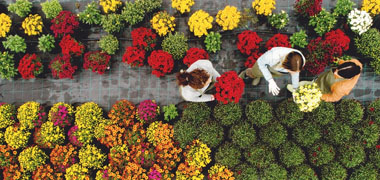
How do I become a farmer?
Bachelor of Agriculture
- There are no mandated entry requirements.





Diploma of Agriculture
- There are no mandated entry requirements.







Bachelor of Science (Agricultural Science)
- There are no mandated entry requirements.



Bachelor of Agricultural Science
- There are no mandated entry requirements.





 Melbourne Polytechnic
Melbourne Polytechnic
Related occupations
Farmhand
A Farmhand performs varied tasks like feeding livestock, operating machinery, maintaining equipment, and assisting with crop care in all weather.
Organic Farmer
Organic Farmers grow crops and raise livestock without chemicals, managing daily tasks like planting, harvesting, and equipment maintenance.
Nursery Hand
A Nursery Hand manages daily tasks in a plant nursery, propagating, cultivating, and caring for plants while ensuring their health.
Vineyard Hand
A Vineyard Hand performs daily tasks related to grape cultivation and harvesting, including soil preparation, irrigation, and grape picking.
Agronomist
Agronomists work with farmers to improve crop quality, collect data, analyze issues, and suggest solutions to enhance production and crop health.
Horticulturalist
A Horticulturalist cultivates plants, assists with crop selection, conducts soil tests, and manages various outdoor projects effectively.
Winemaker
A Winemaker manages the wine production process, from growing grapes to bottling, requiring passion, attention to detail, and physical endurance.
Nursery Manager
A Nursery Manager oversees the plant nursery's operations, managing staff, stock, finances, and ensuring the health of plants.
Agricultural Manager
An Agricultural Manager oversees daily farm operations, from planning to sales, managing budgets, and supervising staff while monitoring market conditions.
Nurseryperson
A Nurseryperson propagates and cultivates plants for sale, tending to their health, advising customers, and processing orders.
Seed Technician
A Seed Technician produces and processes seeds, ensuring proper sorting, packing, and customer advice while operating seed processing equipment.
Agricultural Consultant
An Agricultural Consultant advises clients on crop production, pest control, and agricultural sales, needing strong analytical and communication skills.
Cotton Ginner
A Cotton Ginner processes and grades cotton, removing debris, ensuring safety, and working as part of a team while following procedures and managing time well.
Agricultural Technician
An Agricultural Technician aids farming through crop management, soil testing, irrigation, pest control, and data collection to boost productivity.
Agricultural Scientist
An Agricultural Scientist enhances crop and livestock production through research, sustainable practices, and collaboration with various stakeholders to improve food security.
Agricultural Economist
An Agricultural Economist analyses economic data on agricultural production and markets to improve practices and inform policy, collaborating with stakeholders for sustainability.
Crop Scientist
A Crop Scientist researches and improves crop production and quality, developing techniques to enhance yield and plant health in agriculture.
Common questions
How much does a Farmer earn?
In Australia, a full time Farmer generally earns $1,577 per week ($82,004 annual salary) before tax. This is a median figure for full-time employees and should be considered a guide only. As you gain more experience you can expect a potentially higher salary than people who are new to the industry.
What are the job opportunities for a Farmer?
The number of people working as a Farmer is expected to drop slightly over the next five years. There are currently 178,500 people working as a farmer in Australia. Most farming opportunities can be found in rural or remote areas of Australia.
Source: The Labour Market Information Portal – 2019 Occupation Projections
How do I become a Farmer?
If you’re planning a career as a Farmer, consider enrolling in a Diploma of Agriculture. This qualification allows you to specialise in an area of interest such as agribusiness, livestock, cropping or business administration. You could also enrol in a course such as a Certificate IV in Production Horticulture or a Diploma of Organic Farming.
Further reading


Choosing a security licence course in Australia: A step-by-step guide for jobseekers
10th November 2023)

